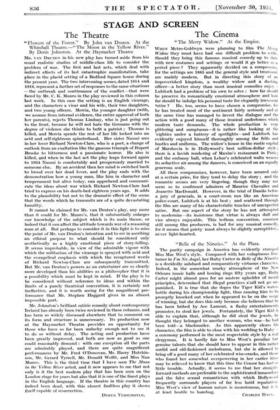"Belle of the Nineties." At the Plaza.
The purity campaign in America has evidently cramped Miss Mae West's •style. Compared with her voluptuous lion- tamer in I'm No Angel, her Ruby Carter in Belle of the Nineties is a decidedly subdued and comparatively virtuous character. Indeed, in the somewhat murky atmosphere of the New Orleans music halls and boxing rings fifty years ago, Ruby Carter might almost pass for an austere upholder of moral principles, determined that illegal practices elan not go un- punished. It is true that she dopes the Tiger Kid's water- bottle during his championship fight, thus causing him to he promptly knocked out when he appeared to be on the verge of winning, but she does this only because she believes that he has been bribed by. Ace Lamont, a flashy entertainments promoter, to steal her jewels. Fortunately, the Tiger Kid is able to explain that, although he did steal the jewels, he thought they belonged to another woman, who was—he had been told—a blackmailer. As this apparently clears his character, the film is able to close with his wedding to Ruby— a ceremony performed in the most respectable style by a real clergyman. It is hardly fair to Miss West's peculiar but genuine talents that she should have to appear in this rather sordid and, old-fashioned melodrama, but she is allowed to bring off a good many of her celebrated wise-cracks, and those who found her somewhat overpowering in her earlier film; may be relieved to know that this time the Censor has had SI) little trouble. Actually, it seems to me that her straight- forward methods are preferable to the sophisticated innuendos4 and the false sexual romanticism with which Hollywood frequently surrounds players of far less lurid reputation. Miss West's view of human nature is monotonous, but it is
at least hostile to huMbug. CHARLES DAVY.










































 Previous page
Previous page